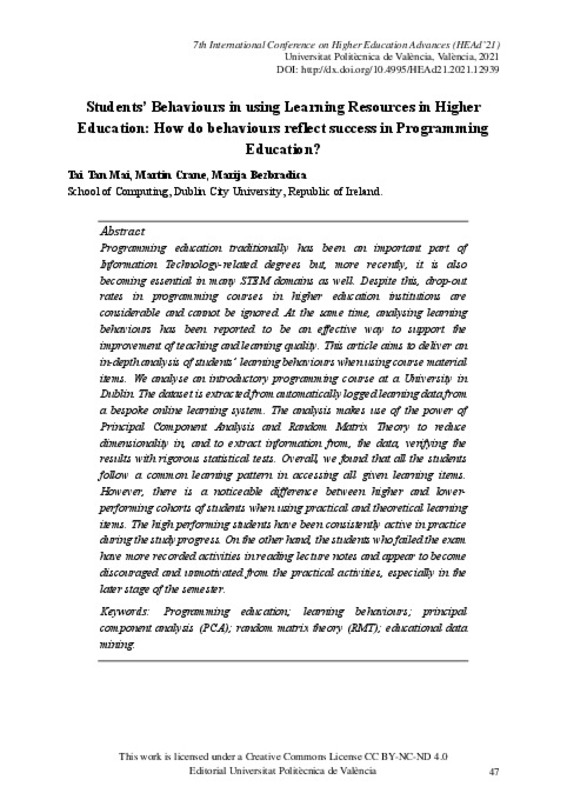JavaScript is disabled for your browser. Some features of this site may not work without it.
Buscar en RiuNet
Listar
Mi cuenta
Estadísticas
Ayuda RiuNet
Admin. UPV
Students’ Behaviours in using Learning Resources in Higher Education: How do behaviours reflect success in Programming Education?
Mostrar el registro sencillo del ítem
Ficheros en el ítem
| dc.contributor.author | Mai, Tai
|
es_ES |
| dc.contributor.author | Crane, Martin
|
es_ES |
| dc.contributor.author | Bezbradica, Marija
|
es_ES |
| dc.date.accessioned | 2021-09-21T10:01:36Z | |
| dc.date.available | 2021-09-21T10:01:36Z | |
| dc.date.issued | 2021-07-26 | |
| dc.identifier.isbn | 9788490489758 | |
| dc.identifier.issn | 2603-5871 | |
| dc.identifier.uri | http://hdl.handle.net/10251/172934 | |
| dc.description.abstract | [EN] Programming education traditionally has been an important part of Information Technology-related degrees but, more recently, it is also becoming essential in many STEM domains as well. Despite this, drop-out rates in programming courses in higher education institutions are considerable and cannot be ignored. At the same time, analysing learning behaviours has been reported to be an effective way to support the improvement of teaching and learning quality. This article aims to deliver an in-depth analysis of students’ learning behaviours when using course material items. We analyse an introductory programming course at a University in Dublin. The dataset is extracted from automatically logged learning data from a bespoke online learning system. The analysis makes use of the power of Principal Component Analysis and Random Matrix Theory to reduce dimensionality in, and to extract information from, the data, verifying the results with rigorous statistical tests. Overall, we found that all the students follow a common learning pattern in accessing all given learning items. However, there is a noticeable difference between higher and lower-performing cohorts of students when using practical and theoretical learning items. The high performing students have been consistently active in practice during the study progress. On the other hand, the students who failed the exam have more recorded activities in reading lecture notes and appear to become discouraged and unmotivated from the practical activities, especially in the later stage of the semester. | es_ES |
| dc.description.sponsorship | This research is financially supported by Irish Research Council. | es_ES |
| dc.format.extent | 9 | es_ES |
| dc.language | Inglés | es_ES |
| dc.publisher | Editorial Universitat Politècnica de València | es_ES |
| dc.relation.ispartof | 7th International Conference on Higher Education Advances (HEAd'21) | |
| dc.rights | Reconocimiento - No comercial - Sin obra derivada (by-nc-nd) | es_ES |
| dc.subject | Higher Education | es_ES |
| dc.subject | Learning | es_ES |
| dc.subject | Educational systems | es_ES |
| dc.subject | Teaching | es_ES |
| dc.subject | Programming education | es_ES |
| dc.subject | Learning behaviours | es_ES |
| dc.subject | Principal component analysis (PCA) | es_ES |
| dc.subject | Random matrix theory (RMT) | es_ES |
| dc.subject | Educational data mining | es_ES |
| dc.title | Students’ Behaviours in using Learning Resources in Higher Education: How do behaviours reflect success in Programming Education? | es_ES |
| dc.type | Capítulo de libro | es_ES |
| dc.type | Comunicación en congreso | es_ES |
| dc.identifier.doi | 10.4995/HEAd21.2021.12939 | |
| dc.rights.accessRights | Abierto | es_ES |
| dc.description.bibliographicCitation | Mai, T.; Crane, M.; Bezbradica, M. (2021). Students’ Behaviours in using Learning Resources in Higher Education: How do behaviours reflect success in Programming Education?. En 7th International Conference on Higher Education Advances (HEAd'21). Editorial Universitat Politècnica de València. 47-55. https://doi.org/10.4995/HEAd21.2021.12939 | es_ES |
| dc.description.accrualMethod | OCS | es_ES |
| dc.relation.conferencename | Seventh International Conference on Higher Education Advances | es_ES |
| dc.relation.conferencedate | Junio 22-23, 2021 | es_ES |
| dc.relation.conferenceplace | València, Spain | es_ES |
| dc.relation.publisherversion | http://ocs.editorial.upv.es/index.php/HEAD/HEAd21/paper/view/12939 | es_ES |
| dc.description.upvformatpinicio | 47 | es_ES |
| dc.description.upvformatpfin | 55 | es_ES |
| dc.type.version | info:eu-repo/semantics/publishedVersion | es_ES |
| dc.relation.pasarela | OCS\12939 | es_ES |
| dc.contributor.funder | Irish Research Council | es_ES |








